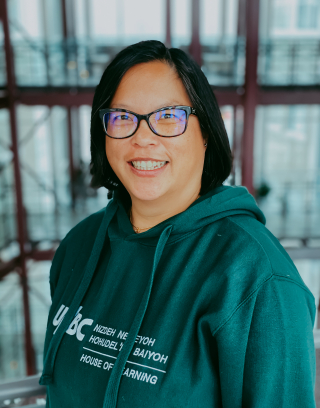
February 21, 2026 – Thank You Winnipeg
What a cute photo… we just landed in Winnipeg in this image and we were in Winnipeg for WestCAST 2026 at the University of Winnipeg. We had a great time in Winnipeg and I’m so grateful to work with these teacher candidates from the UNBC teacher education program. This crew each wanted to present inquiry topics individually and they were each EXCEPTIONAL in their presentations. I am so proud of them. I am a little regretful that we do not do e-portfolios anymore in the program to read about what they would say about WestCAST and Winnipeg, but I feel that they shared lots of gratitude. What an experience!!
I guess I will take the liberty to share a little bit of our trip to Winnipeg. First of all, I would like to thank the UNBC School of Education and Chair for making this trip possible for the teach candidates. This trip would not be possible without that support. Second, I would like to thank the participating teacher candidates for their interest and willingness to prepare and present at WestCAST. To do so, they are working above and beyond the teacher education program, which can be very difficult. They each presented an inquiry that was important to them.
One presented about how ADHD is a superpower and the benefits of UDL, one presented on learning about their Indigenous ancestry through beading and wanting to include beading circles as part of their pedagogy, and one presented on BIPOC learners with exceptionalities and developing one’s cultural competency to create an inclusive and equitable learning environment. I presented about coaching and mentoring teacher candidates and creating a third space for these teacher candidates as part of a self-study. I also presented with members of BCTEN about Connective Professionalism. It was so great!!
I feel very lucky to be a part of BCTEN and UNBC teacher education program to make learning experiences like this possible. I appreciated our collegiality, collaboration, and cooperation. I feel grateful to have wonderful colleagues and peers to work with, but also have amazing teaching candidates to work with. I am reminded about what I love about my career and profession. I love the people, the creativity, and the connection. The theme of the conference was “Together, We Grow.” It’s about community, and I loved the words shared by keynote speaker, David Robertson. We are better together, and I feel that this togetherness, community, and human connection are at the heart of what I do.
Below, is a photo of us near the end of our trip in Winnipeg. We went to the Forks, Canadian Museum of Human Rights, and Festival de Voyageur. We had a great time. I also got to connect with colleagues from UBC, UVic, and SFU… but also meet folks from the conference planning committee from the University of Winnipeg and folks from other universities who seek to do the same work as me. Working with teacher candidates and undergraduate students is amazing. I also bumped into a former school trustee friend from Manitoba. He’s now the president of CSBA. (I knew him before he was famous). And, it was like no time had passed… when I think it was about 10-12 years ago since we had first met.
Thank you Winnipeg!! I feel hopeful, inspired, and connected. WELL DONE!!














